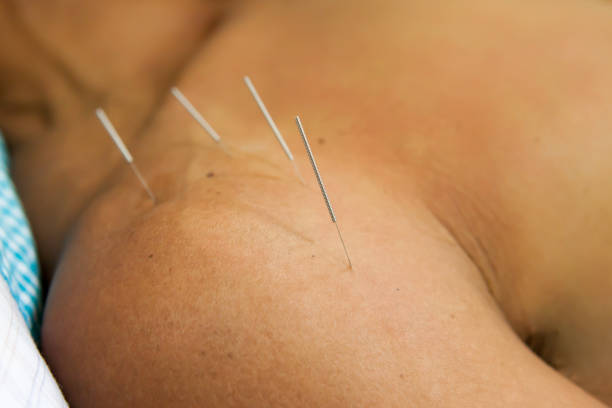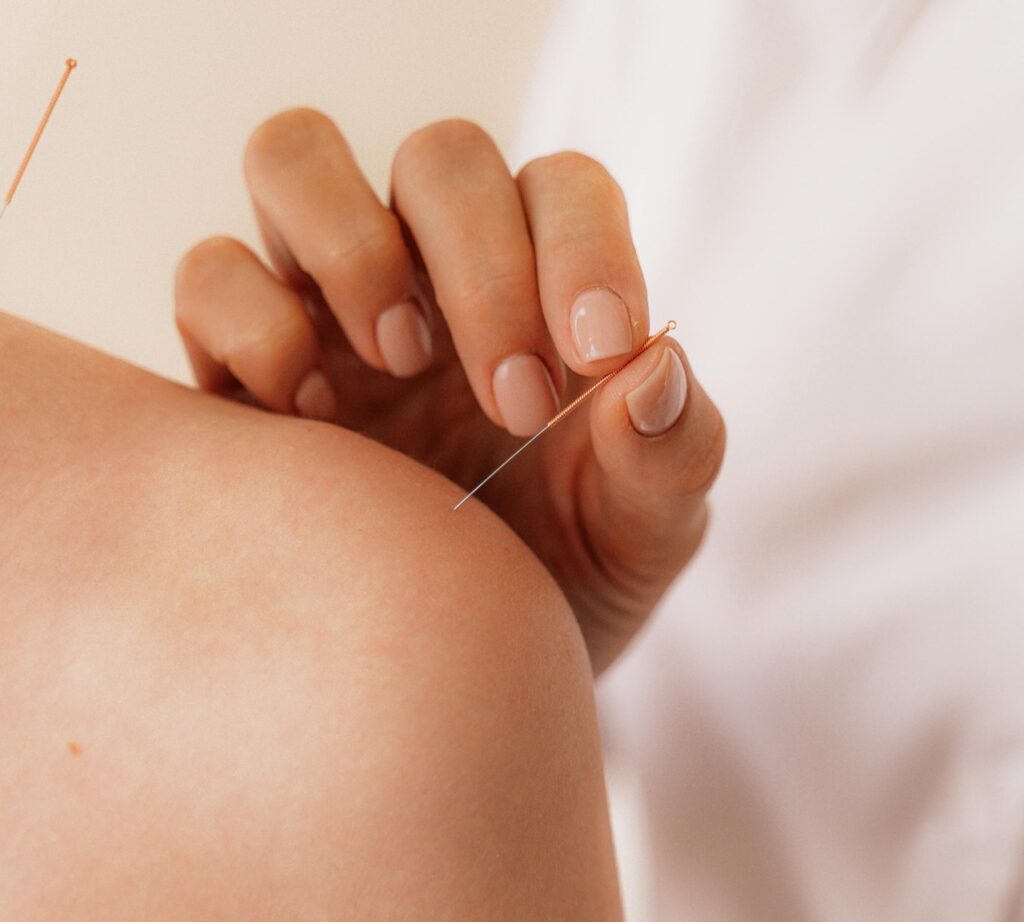Alternative Treatments, Naturopathy
Does Acupuncture Really Work for Frozen Shoulder?
Are you suffering from frozen shoulder and looking for a natural solution like acupuncture to get relief? Look no further, this ancient Chinese therapy has been utilized for millennia to treat a variety of conditions, including musculoskeletal diseases such as frozen shoulder. Acupuncture is the process of inserting tiny needles into certain places on the body to stimulate the passage of qi and facilitate healing.
When it comes to frozen shoulder, acupuncture can be extremely helpful at relieving discomfort and increasing range of motion. According to research, acupuncture can enhance blood circulation, reduce inflammation, and release endorphins, the body’s natural painkillers. Acupuncture can provide long-term healing by addressing the body’s fundamental imbalances.
Unlike drugs or invasive surgeries, acupuncture is a safe and non-invasive treatment with little adverse effects. Many people find acupuncture to be a peaceful and delightful experience since it restores balance not just physically, but also psychologically and emotionally.

What is Frozen Shoulder?
Frozen shoulder, often called adhesive capsulitis, is a disorder that causes discomfort and stiffness in the shoulder joint. It usually develops gradually and goes through three stages: freezing, frozen, and melting. During the freezing stage, pain and stiffness gradually grow, making it difficult to move the shoulder. The pain may lessen during the frozen period, but the shoulder remains rigid and movement is severely restricted. Finally, during the thawing period, the pain and stiffness progressively subside and range of motion begins to recover.
Causes and Symptoms of Frozen Shoulder
The specific etiology of frozen shoulder is unknown, although some variables can increase the likelihood of acquiring the illness. Diabetes, thyroid diseases, hormone imbalances, shoulder injuries, and extended shoulder immobility are all examples. Frozen shoulder is more prevalent in women and those over the age of 40.
The primary symptoms of frozen shoulder include discomfort, stiffness, and a limited range of motion in the shoulder joint. The discomfort might be dull and agonizing, and it’s most irritating at night, making it difficult to sleep on the affected side. Over time, shoulder stiffness can make it difficult to accomplish daily tasks like dressing, reaching above, and even combing your hair.

Traditional Treatment Options for Frozen Shoulder
Traditional treatments for frozen shoulder try to alleviate pain and increase range of motion. Physical therapy, pain medicines, corticosteroid injections, and, in severe situations, surgery are all options.
Physical therapy is frequently advised as the first line treatment for frozen shoulder. It consists of particular exercises and stretches aimed to increase shoulder mobility and alleviate discomfort. Nonsteroidal anti-inflammatory medicines (NSAIDs) can aid with pain relief and inflammation reduction. Corticosteroid injections can provide short-term comfort by lowering inflammation in the shoulder joint. In rare circumstances, surgery may be required to relieve the tight capsule that surrounds the shoulder.
How Does Acupuncture Work for Frozen Shoulder?
Acupuncture is founded on the concept of balancing the body’s energy, or Qi, which runs along specific paths known as meridians. When these channels become obstructed or unbalanced, it can cause pain and sickness. Acupuncturists can restore equilibrium to the body by putting small needles into precise acupuncture locations.
In the instance of frozen shoulder, acupuncture can help by addressing the underlying imbalances that cause pain and limited movement. The needles used in acupuncture cause the release of endorphins, the body’s natural painkillers. Acupuncture has also been demonstrated to enhance blood circulation and reduce inflammation in the shoulder joint, promoting recovery.
Research and Evidence Supporting Acupuncture for Frozen Shoulder
Several research have looked into the efficacy of acupuncture for frozen shoulder, with positive findings. A comprehensive review published in the Journal of Orthopaedic Surgery and Research discovered that acupuncture was beneficial in relieving pain and increasing shoulder function in individuals with frozen shoulder. Another study published in the Journal of Integrative Medicine found that acupuncture plus physical therapy was more helpful than physical therapy alone in reducing pain and range of motion in frozen shoulder patients.
While further research is needed to completely understand the mechanisms underlying acupuncture’s effectiveness for frozen shoulder, these results show that acupuncture may be a viable therapy choice for those seeking natural relief.

Finding a Practitioner
When looking for acupuncture treatment for frozen shoulder, be sure you pick a trained and experienced acupuncturist. Look for practitioners who have been licensed and certified by respectable acupuncture organizations. You can also seek referrals from your healthcare physician or friends who have received acupuncture treatment.
During your initial session, the acupuncturist will evaluate your condition and develop a unique treatment plan based on your specific requirements. They will decide which acupuncture sites to target and discuss the frequency and duration of your sessions.
What to Expect During an Acupuncture Session for Frozen Shoulder
An acupuncture session usually starts with the acupuncturist cleaning the insertion points with alcohol or another disinfectant. They will then carefully place small needles into the appropriate acupuncture spots. The needles are normally left in place for 15-30 minutes while you rest and wait for the treatment to take effect. Some people may feel a minor sensation of discomfort after needle insertion, although this should not be painful.
Many people find acupuncture to be a calming and enjoyable experience. Some even report feeling calmer and more energetic after their sessions. The number of sessions required will depend on the severity of your frozen shoulder and your body’s response to acupuncture.
Potential Side Effects and Precautions of Acupuncture for Frozen Shoulder
Acupuncture is generally regarded as safe when performed by a skilled practitioner. However, there are certain potential adverse effects and precautions to be aware of. These can include slight bleeding or bruising at the insertion sites, transient worsening of symptoms, and allergic reactions to the needles or disinfectants used.
It is critical to notify the acupuncturist about any current medical issues, drugs you are taking, and any past acupuncture experiences. This will allow them to personalize the treatment to your unique needs while ensuring your safety.
Conclusion
Acupuncture provides a natural, comprehensive method to treating frozen shoulder. Acupuncture can alleviate pain and stiffness while also improving range of motion by addressing underlying imbalances in the body. Acupuncture has shown excellent outcomes in terms of treating frozen shoulder, making it a potential therapy choice for people looking for alternatives to established therapies.
If you’re dealing with the pain and limited mobility caused by a frozen shoulder, you should look into the benefits of acupuncture. Consult a skilled acupuncturist to discuss your individual ailment and whether acupuncture is correct for you. With a long history of practice and a growing body of scientific data, acupuncture can help you reclaim control of your shoulder health and general well-being.
Trusted Health, Wellness, and Medical advice for your well-being


